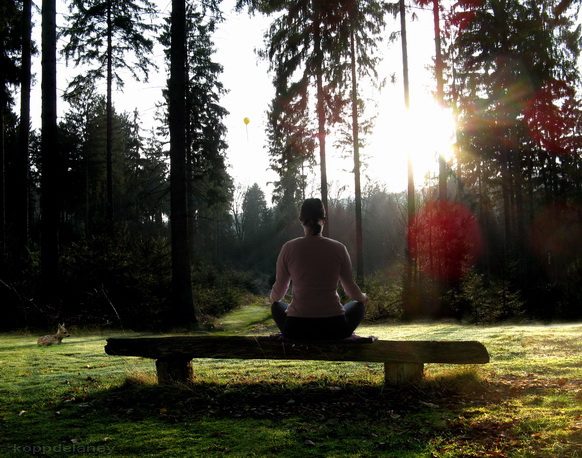
Photo from Hartwig HKD used under Creative Commons license.
I’ve heard several people extol the virtues of meditation over the years, from author Deepak Chopra to my husband, and I’ve always had excuses why I didn’t do it.
I didn’t know how, I had trouble quieting my brain — but the biggest reason was feeling like I didn’t have time.
In “The Seven Spiritual Laws of Success,” Chopra advocates meditating 30 minutes in the morning and again 30 minutes in the evening. Who has a spare hour to just sit quietly and do nothing?
But I never really have totally open, unscheduled time — if I did, that would probably mean I was already sitting quietly — and instead, I make time for what matters. A few years back, I wrote about author Laura Vanderkam’s time management recommendations, including saying “It’s not a priority,” instead of “I don’t have time” to remind ourselves that time is a choice and if we don’t like how we’re spending an hour, we can choose differently.
The Bureau of Labor Statistics says adults without children under 18 typically engage in about 4.5 hours of leisure activities each day, and about three of those hours are watching television. While we don’t have cable and don’t sit in front of the TV nightly, I still think there’s a message there about having free time that you can spend on what matters.
John and I recently committed to going to the gym three times a week, which requires making that a priority in our planning. Likewise, meditation required making a decision that my mental health is important enough to make time.
So I took a baby step and committed to sitting quietly for 15 minutes each morning. That’s a fraction of what Chopra recommends, but it’s a start.
Meditation is just a formal word for “sit still, shut up.” Don’t watch TV or read a book, and in the sitting still, try to quiet your brain. Instead of thinking about what you need to do that day or whatever’s stressing you out, give your brain a break.
Why meditate?
- Scientists find meditation changes your brain after just eight weeks. They reported changes in the parts of the brain that are associated with memory, sense of self, empathy and stress.
- ABC News reported on several meditation studies, including one doing brain scans on Tibetan monks. One researcher is quoted as saying people who meditate are more empathetic, use less harsh language and laugh more.
- Mayo Clinic suggests meditation might help your health — both your emotional well being and as a tool to manage some physical conditions.
- As I blogged earlier this week, there are benefits to giving your brain task-negative time, to help reset your brain and release inspiration.
If you might like some of these benefits in your life, here are some resources for getting started.
- Zen Habits on how to get started meditating
- New York Insight Meditation Center’s tips on getting started with meditation
- 10 tips for starting meditation from Goodlife Zen
- Mindful magazine addresses common challenges to meditation and how to deal with them

7 Comments
H.T. Riekels
15 minutes is fine when you are getting started. That’s how I began. And remember, it is not about keeping your mind still the entire time. It’s a training regimen. That’s why they call it meditation “practice.” Treat it like exercise and eating right. The benefits are just as real.
Leave a reply